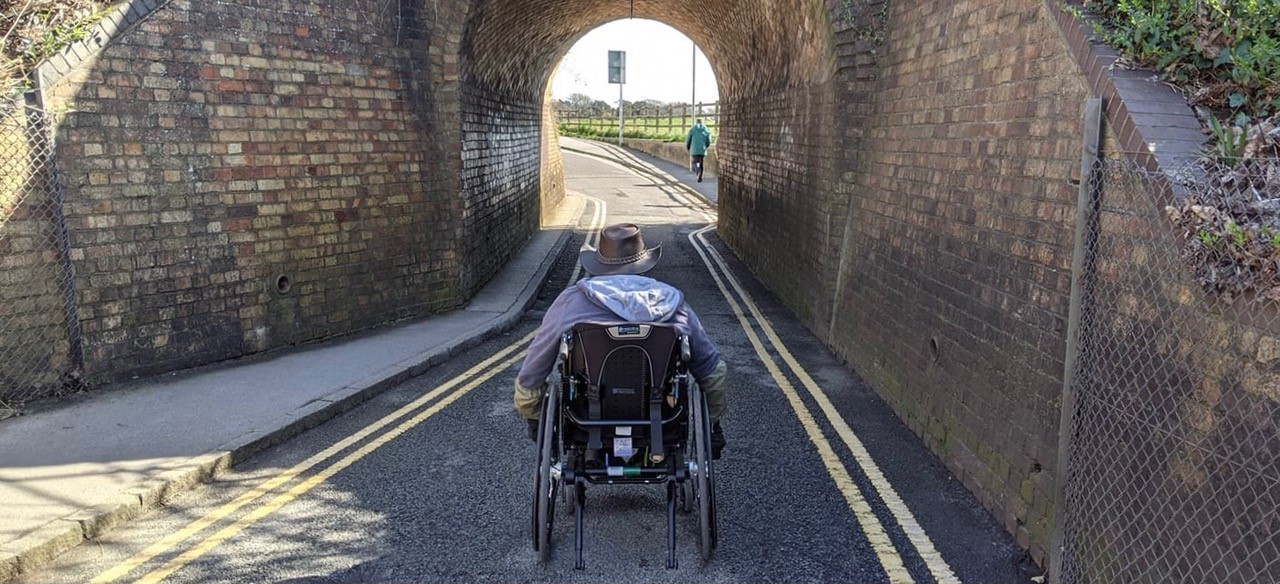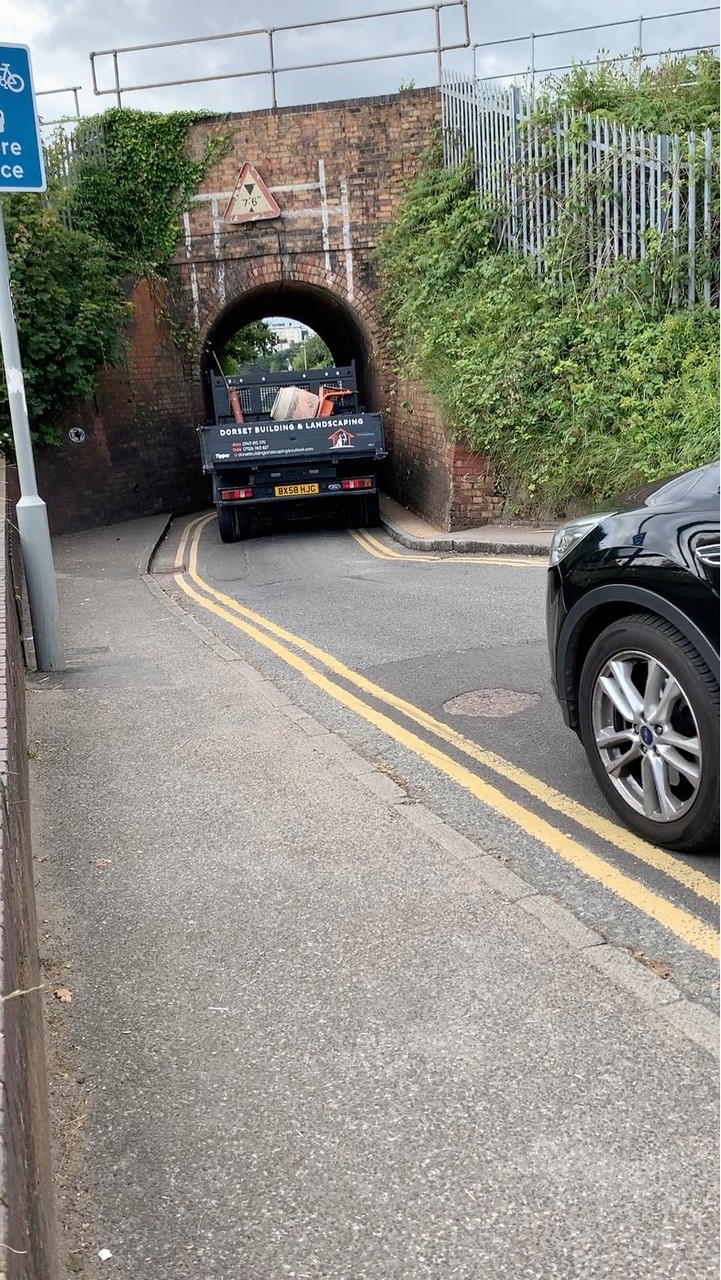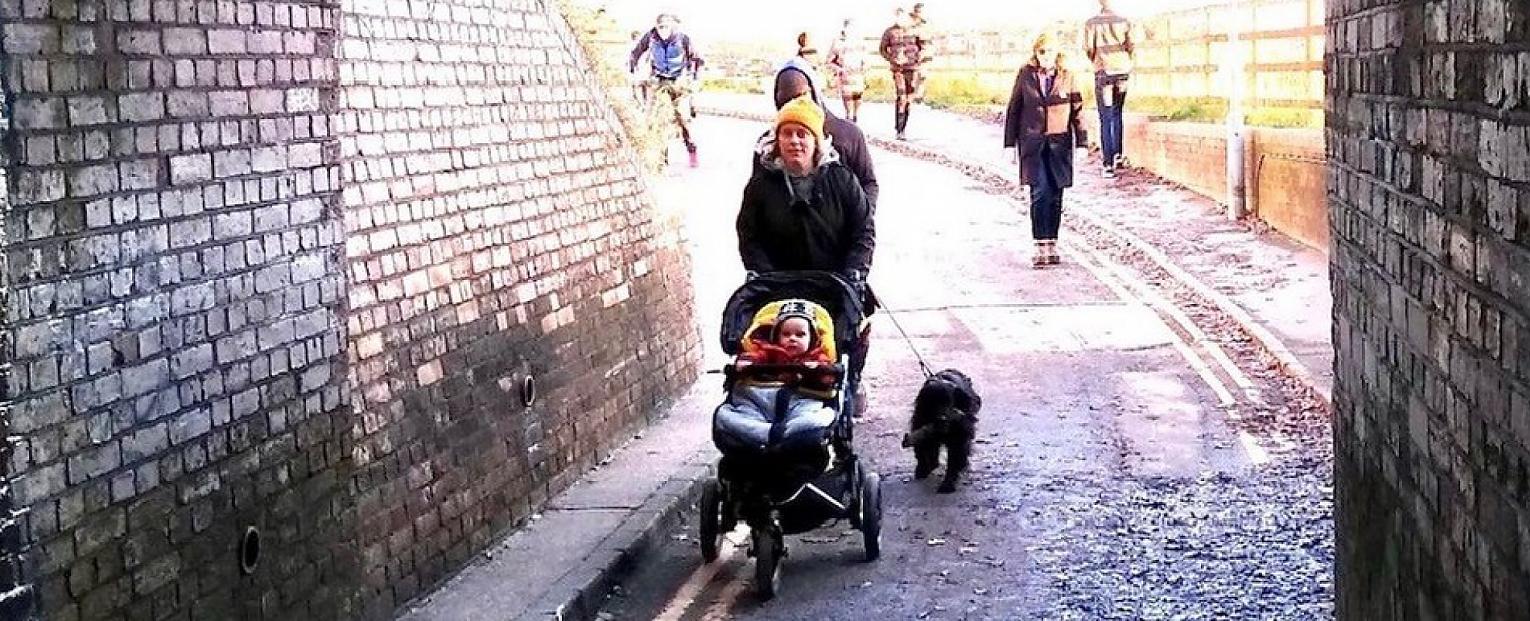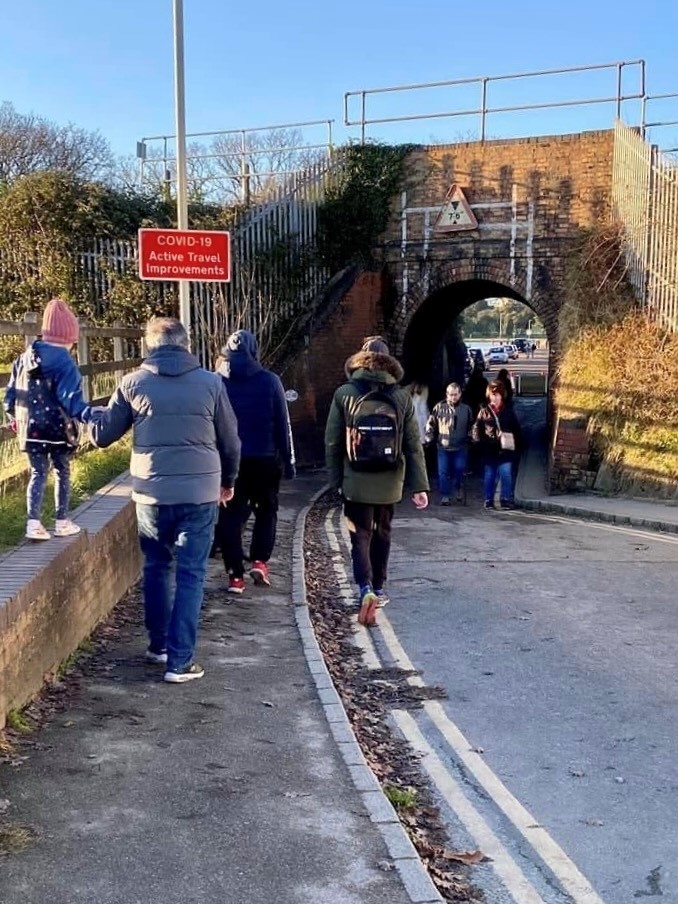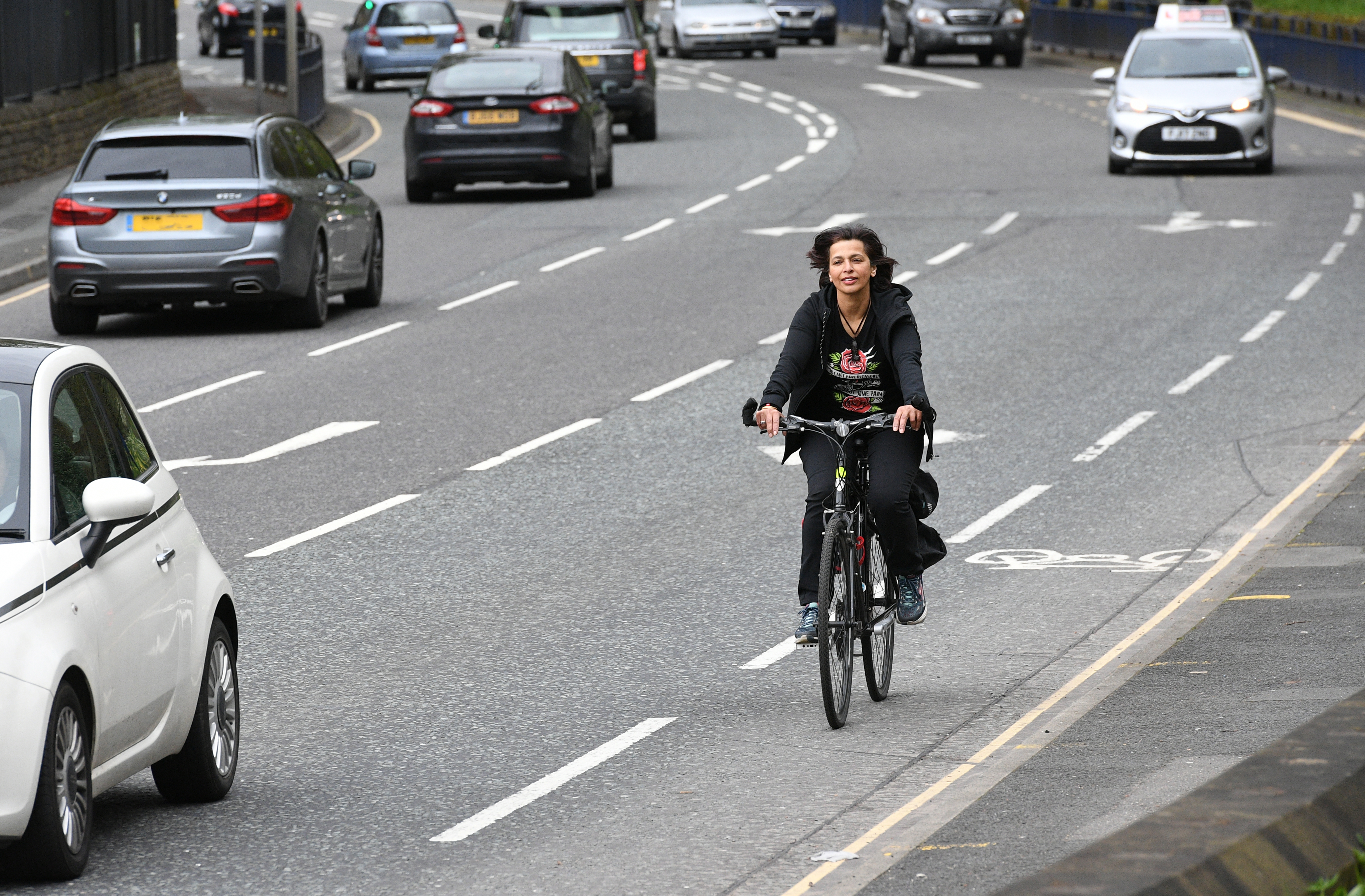Why the closure of the Keyhole Bridge matters
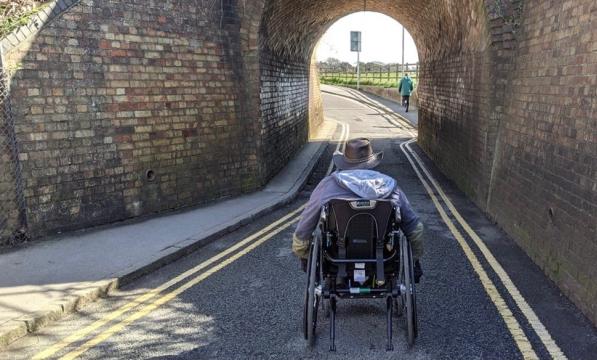
Ten days ago, Cycling UK’s lawyers wrote to Bournemouth, Christchurch and Poole Council (BCP) threatening legal action unless it reconsidered a controversial decision to keep the narrow Keyhole Bridge underpass in Poole open to motor traffic.
For those not familiar with the story, Whitecliff Road connects Poole Park with Whitecliff Harbour Park and passes under Keyhole Bridge. It’s used by drivers as a rat-run to avoid the gyratory system in the centre of Poole.
Back in August 2020, BCP made an experimental traffic order prohibiting motor vehicle access under the bridge, but the council ended their consultation on the closure a month early in January 2021, reopening the underpass to motor vehicles in March 2021.
Locals, who wanted to maintain the route between the parks as a safe route for people walking and cycling, came together as the Keyhole Bridge Group (KBG), took BCP to court, and won a judicial review case in October 2021, with the Judge ordering BCP to carry out another consultation and to pay KBG’s costs.
In the meantime, KBG commissioned an expert report from KMC Transport Planning, which concluded that BPC had ignored its own policies when it reopened the underpass to motor traffic, and that keeping it closed would have yielded a positive financial impact of £8.5 million over a 20-year period.
Last December, however, BCP rejected the public support for re-instating the closure which the further consultation demonstrated, and KMC’s report. It voted to carry on regardless, allowing cars through the rat-run.
So, it’s last December’s decision that Cycling UK are looking to challenge, and we await BCP’s formal response to our letter before taking further action next week.
Of course, we don’t have the resources or capacity to wade into every local issue or continually instruct lawyers to challenge decisions, so what makes the Keyhole Bridge case important?
Well, the last time we issued a judicial review, we were challenging West Sussex County Council’s (WSCC) decision to remove a cycle lane in Shoreham. We eventually won that in January last year, with WSCC admitting it had acted unlawfully in removing the cycle lane because it had failed to take into account the relevant statutory guidance issued to highway authorities.
When we picked up the Shoreham case, we were really concerned that numerous councils were paying lip service to statutory guidance issued by the Department for Transport (DfT) which was designed to support active travel.
We wanted to send a message to councils that ignoring the guidance and ripping out cycle lanes or other active travel measures, like the bollards under Keyhole Bridge which restricted vehicle access, would have consequences. We wanted to make sure that excellent DfT guidance was actually followed by councils.
[video: https://youtu.be/wi01KpI5bCg?list=TLGGZKWdrHSym9kxMDAyMjAyMw]
Tragically, a year on from WSCC admitting its unlawful actions, the council still doesn’t seem to have moved forward with any plans to introduce a permanent cycle lane, though we await a response to our recent letter requesting clarification of any plans or progress on this.
And, having already lost in court once, BPC have followed WSCC’s lead, having also failed to have regard to the same statutory guidance which WSCC ignored.
That’s why Cycling UK has instructed lawyers to try to challenge the Keyhole Bridge decision, because this isn’t just about one underpass in a park in Poole. It’s a tale of a council failing to consult properly, ignoring the evidence, and ignoring government guidance. It feels like the message we hoped to send about the Shoreham case hasn’t been heard in Poole, or as widely as we’d hoped, and we need to press re-send.
However difficult it is for Cycling UK to take action like this, it doesn’t compare with the incredible efforts of local campaigners and groups who’ve also gone to court to challenge council decisions which either prevent or discourage people form walking and cycling.
KBG had already taken BPC to court once and, in Kensington, the fantastic people at Better Streets for Kensington and Chelsea (BetterStreets4KC) have been battling for two years with the Royal Borough of Kensington and Chelsea (RBKC) over the removal of the cycle lane on Kensington High Street. The final hearing in that case has now taken place, but the judge’s decision hasn’t yet been announced.
Of course, litigation is uncertain, and BetterStreets4KC might not win their case in court, but they have certainly highlighted the issues, RBKC’s appalling disregard for the safety of people walking and cycling and their ineptitude when it comes to supporting measures which enable more people to travel actively.
And, at Cycling UK, we want to highlight how BCP has behaved, and their disregard for the crucial statutory guidance they are supposed to follow when making transport decisions, because we need other councils to think twice before following suit.
But, let's go back to where I started, and to my point that we can’t get involved in every local case, and the realities of resources: Cycling UK is only able to consider potential legal challenges, instruct lawyers, and sometimes go to court, because we have the Cyclists’ Defence Fund (CDF).
The CDF helps us fight significant legal cases involving cyclists and cycling, especially those which could set important precedents for the future and could affect the safety of people who cycle, or might cycle if it felt safer. It’s supported by clubs, members and individuals who have all made contributions to help ensure Cycling UK is ready to act when it's really needed, as we did in Shoreham.
Over the last year alone, through CDF, we’ve:
- Contributed £2,500 to support BetterStrret4KC’s legal challenge regarding the Kensington High Street cycle lane.
- Supported Tom Bosanquet, one of our members, with financial support and advice for his legal case when he was being wrongly prosecuted for inconsiderate cycling for delaying traffic for a matter of seconds. The CPS saw sense and dropped the case.
- Following the threat of legal action, forced the Department for Environment, Food and Rural Affairs and Natural England to reconsult on plans for the new National Trail, to make it accessible for people cycling and horse riding.
But the work funded through CDF is entirely dependent on donations and we can only carry on doing this with your support for CDF, so please contribute if you want us to keep fighting not just for people who already cycle, but those who can’t or won’t - but might, if councils like BPC followed the guidance and didn’t make decisions which make it harder for people to cycle.
Please consider donating today.


